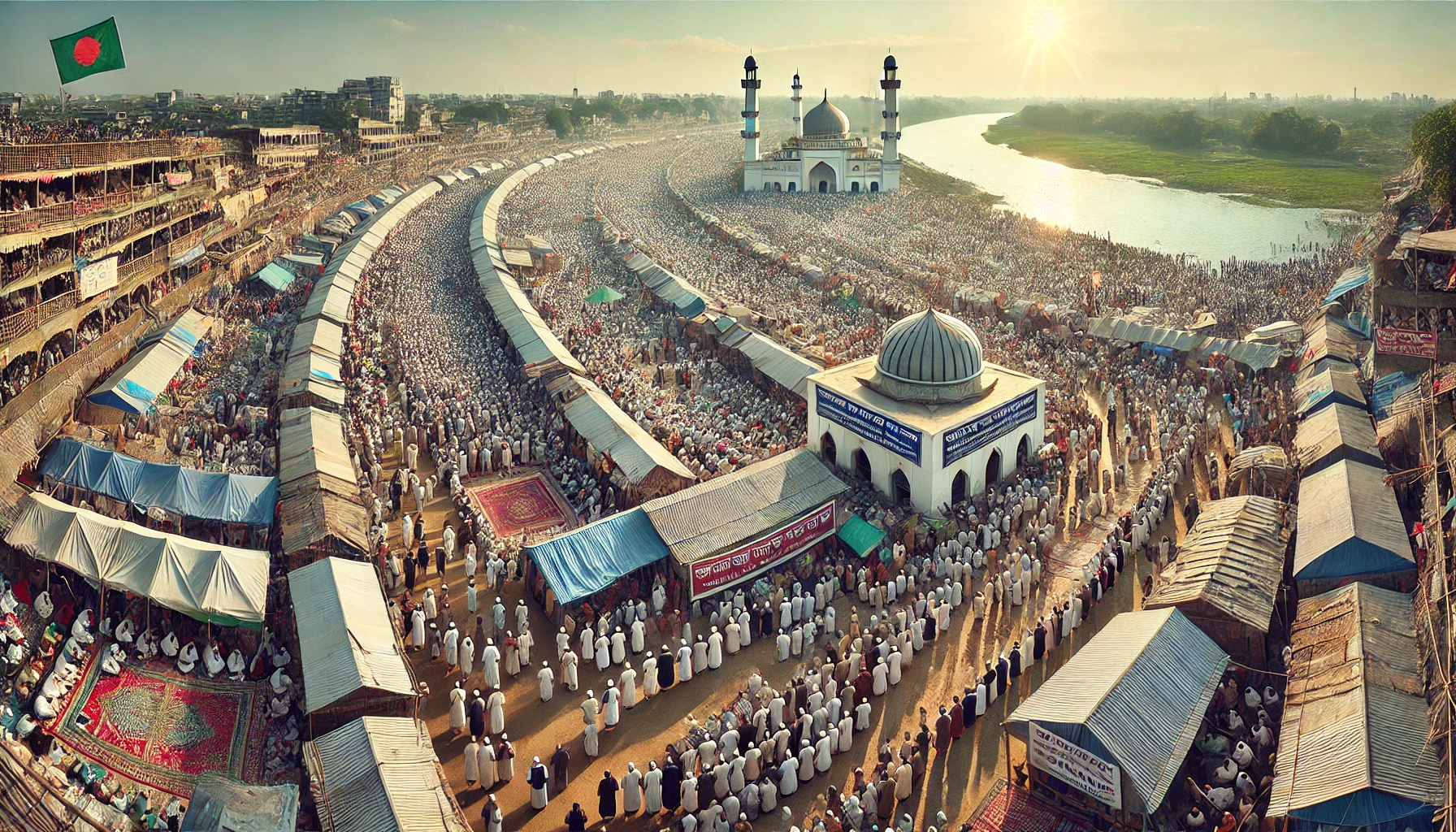
Disclaimer: This content was generated using AI. While I strive for accuracy, I encourage readers to verify important information. I use AI-generated content to increase efficiencies and to provide certain insights, but it may not reflect human expertise or opinions.
Biswa Ijtema, held annually on the banks of the River Turag at Tongi, Bangladesh, is one of the largest Islamic gatherings in the world. It is a powerful testament to the unity, devotion, and spiritual fervor of Muslims from across the globe. This event, often referred to as the “World Congregation,” brings together millions of believers who come to renew their faith, seek spiritual enlightenment, and foster a sense of global Islamic brotherhood. The event’s scale, spiritual significance, and impact on the local and global Muslim communities make it a truly unique phenomenon in the religious world.
The Origins and Evolution of Biswa Ijtema
Biswa Ijtema traces its roots back to the teachings of Maulana Muhammad Ilyas Kandhlawi, the founder of the Tablighi Jamaat movement in the early 20th century. The Tablighi Jamaat, which emphasizes personal piety, simplicity, and a return to the core teachings of Islam, quickly gained a following across the Indian subcontinent. The movement aimed to rejuvenate the spiritual lives of Muslims through grassroots efforts, focusing on spreading the message of Islam among the masses.
The first formal gathering that would evolve into Biswa Ijtema was held in 1946 in the town of Bhopal, India. However, as political and geographical changes occurred in the region, the event moved to its current location in Tongi, near Dhaka, Bangladesh, in the 1960s. Since then, Biswa Ijtema has grown exponentially, attracting millions of participants from around the world.
Over the decades, the event has retained its core principles while adapting to the challenges of hosting such a massive gathering. Despite its growth, Biswa Ijtema remains true to its original purpose: to foster a deep, personal connection with God and to encourage Muslims to live their lives according to the teachings of the Prophet Muhammad.
The Experience of Biswa Ijtema: A Spiritual Journey
Attending Biswa Ijtema is often described as a transformative experience, both spiritually and emotionally. Pilgrims travel from all corners of the globe, often enduring long and arduous journeys, to reach the sacred grounds by the Turag River. For many, the journey itself is an act of devotion, a symbolic return to the simplicity and humility that are central to the Islamic faith.
Upon arrival, participants immerse themselves in an environment where the air is thick with the sounds of prayers, recitations from the Quran, and the hum of heartfelt discussions on religious matters. The sprawling grounds are filled with tents and makeshift shelters, where pilgrims sleep, eat, and engage in religious activities. Despite the large crowds, there is a palpable sense of peace and unity among the attendees.
The three-day event is structured around a series of lectures, sermons, and prayer sessions, led by esteemed Islamic scholars and leaders. These sessions cover a wide range of topics, from the fundamental teachings of Islam to the application of these principles in everyday life. The emphasis is on spiritual growth, self-reflection, and the pursuit of a life that aligns with Islamic values.
The Global Impact of Biswa Ijtema
Biswa Ijtema’s influence extends far beyond the borders of Bangladesh. It is a global event that draws participants from over 150 countries, making it a melting pot of cultures, languages, and traditions. This diversity enriches the experience, as pilgrims share their unique perspectives and learn from one another in an atmosphere of mutual respect and understanding.
The event serves as a platform for fostering global Islamic unity, a key objective of the Tablighi Jamaat movement. In a world where Muslims often face challenges related to identity, integration, and religious expression, Biswa Ijtema offers a space for reaffirmation of faith and collective strength. It reinforces the idea that, despite geographical and cultural differences, Muslims are united by their shared beliefs and values.
Moreover, Biswa Ijtema has a significant impact on the local economy and infrastructure of Tongi and the surrounding areas. The influx of millions of pilgrims requires extensive planning and resources, involving local authorities, volunteers, and international organizations. The event stimulates economic activity, creating temporary jobs and boosting local businesses. However, it also presents challenges, particularly in terms of environmental sustainability and resource management.
Challenges and the Future of Biswa Ijtema
Despite its spiritual significance and global appeal, Biswa Ijtema faces several challenges that could impact its future. One of the most pressing issues is the sheer scale of the event. Managing a gathering of millions requires meticulous planning and coordination, particularly in areas such as transportation, sanitation, and healthcare. The organizers must ensure that the infrastructure can support the massive influx of people without compromising safety or the environment.
Environmental concerns are also increasingly relevant, as the large number of participants inevitably puts a strain on the local ecosystem. The banks of the Turag River, in particular, face the challenge of waste management and pollution control. Efforts are being made to promote sustainable practices, such as reducing plastic use and implementing effective waste disposal systems, but these initiatives require ongoing commitment and innovation.
The future of Biswa Ijtema may also be influenced by broader geopolitical and social factors. The event’s emphasis on Islamic unity and the peaceful propagation of faith is at odds with the growing polarization and religious tensions in some parts of the world. Ensuring that Biswa Ijtema remains a space for peaceful reflection and spiritual growth will require continued efforts to foster inclusivity and dialogue.
In conclusion, Biswa Ijtema is not just a religious gathering; it is a powerful symbol of global Islamic unity, spiritual devotion, and the enduring appeal of the Tablighi Jamaat’s message. As it continues to evolve in response to the challenges and opportunities of the modern world, Biswa Ijtema will undoubtedly remain a cornerstone of the global Muslim community for years to come.








